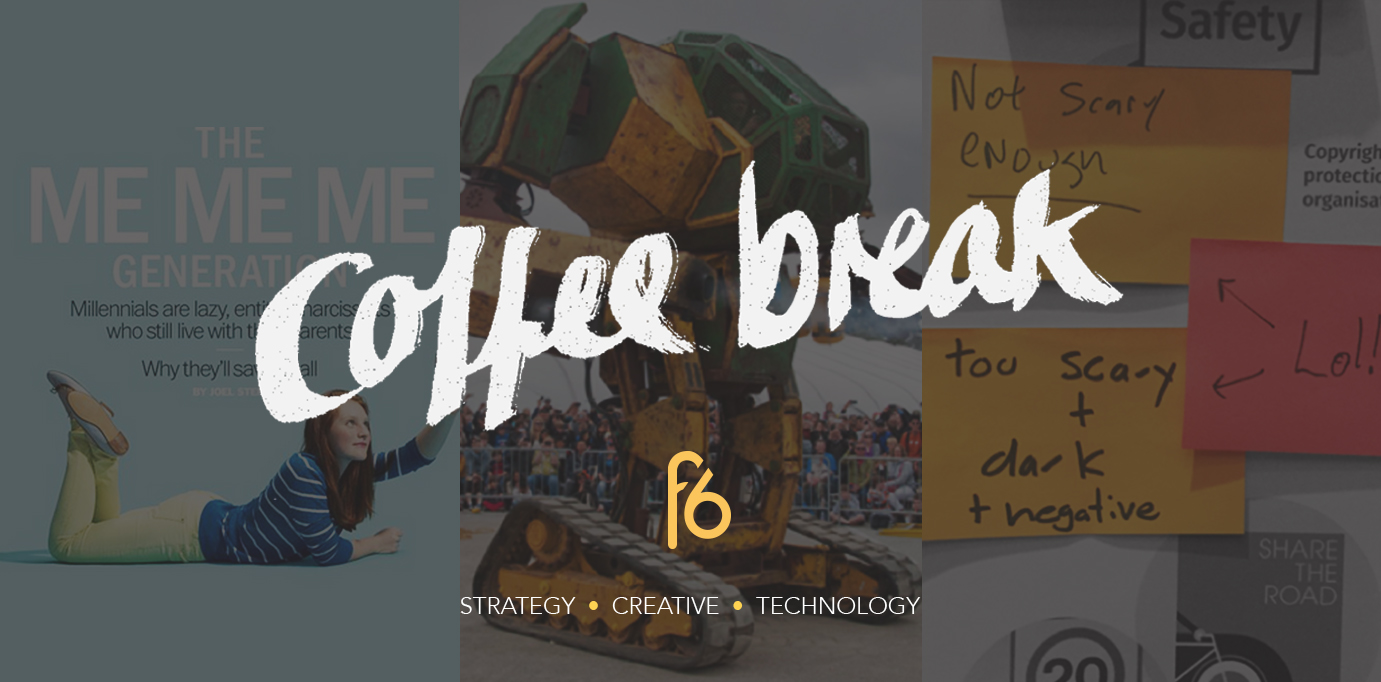Here’s our round-up of what we’ve been talking about this week including Great Robo Rumbles, open sourcing your rebrand to 30,000 other people, and why millennials might not be so bad after all.
Jacob, PR & Social Media
Cheeky marketing and the Great Robo Rumble
You might need to sit down for this one. Giant fighting robots are now a thing.
San Francisco based company Megabots have produced the US’s first fully functional, giant piloted robot. Dubbed the Mk. II, this metal monster is a ’15-foot tall, 12,000lb robot capable of hurling 3lb projectiles at speeds of over 130 MPH’. Isn’t it beautiful?
Frankly, I’m in shock. It’s a rare occasion that something we know as fiction becomes reality – how many of us have waited by the door for our letter from Hogwarts, tried to levitate our phone with the Force or checked the bushes for Pokémon? More than just me, I hope. And yet here we are in 2016, potentially about to witness a Transformers scene brought to life.
However, Megabots had a massive task ahead of them. They needed a marketing strategy that would not only build them a following worthy of a US $500k Kickstarter campaign – they were also essentially setting out to create a new competitive sport.
And so they used a classic trick – the age-old act of calling someone out.
Decked out with sunglasses and star-spangled capes, the two CEOs of Megabots strutted their stuff in their workshop while issuing a challenge to Suidobashi Heavy Industries, the Japanese company credited with building the world’s very first giant bot.
Suidobashi replied within a week.
The act of slating your competitors subtly or otherwise is called negative campaigning, and it’s a concept that’s been around as long as markets have had contested ideas. Famous examples include the ‘Daisy Girl’ ad from the 1964 US presidential election, or Avis Car Hire’s ‘We Try Harder’ campaign, also from the 1960s.
Today, throwing down the proverbial gauntlet over the internet is a fantastic marketing strategy – the exposure and reception provided by social media platforms such as Twitter and Youtube make them prime battlegrounds… as long as your company is up to the task.
While this bot vs bot banter is less of an insidious guerrilla war and more of a ‘come at me bro’, it’s proven fantastic both for building a social media following and securing their place in the sporting world.
I, for one, cannot wait to see these mechanical behemoths beat the absolute crap out of each other.
Sian, Creative Artworker
What happens when you ask 30,000 people to help design your brand identity?
A few months ago Mozilla announced it had a problem. While its flagship project Firefox has a distinctive visual identity system, and is currently the second most popular web browser in the world, nobody knows who Mozilla is or what they do (This proved correct when I told copywriter what I was writing about, and he replied “who?”). ‘Okay,’ you might say, ‘hit up an agency and start a rebrand, see you in a few months’. Instead, Mozilla had a better idea.
The non profit organization’s mission of ‘building a better internet’ is built upon open sourcing and collaboration. So why not open source the new brand identity system and ask for feedback from the community? Inspired? Yes. Risky? Even more so.
Nothing like this has been done before. We’re all used to the industry standard process of the agency and client going back and forth before the agency goes off and works on the final deliverables. But designing alongside feedback from a community of 30,000 people, plus keeping the general Internet population happy (see Instagram’s logo for more on how logo design is now a brutal spectator sport), is terrifying. Brilliantly inspired, but terrifying.
So for a few months now I’ve been eagerly following along with this great blog, and this week, the first round of visuals are in! From the origami Flik-Flak designed to appeal to makers, to an impossible M and a wireframe that focuses on connecting the internet, there are seven draft identities in total, each attacking the brief from different ways. Mozilla are now openly asking which fits best with the criteria they sourced feedback on previously.
Does the Internet really need an invitation to give feedback? Not really. But this time it could save us from another social media train wreck like The Met.
Elena, Account Executive
Millennials: we aren’t so bad after all
Millennials are the topic of the year. I’ve written about this before as it fascinates me how marketers are milking this buzzword.
Millennials have been extensively criticised and accused of disrupting the workplace, asking for perks, flexible work hours, and a fun company culture. However, a new study suggests that millennials actually consider themselves, and want to be considered, as “work martyrs”. But what does this mean? According to the study, millennials are less likely than older generations to take all their vacation time and feel guilty when taking time off. They (we) want to show complete dedication to their company and work and don’t want others to think they are replaceable.
As another article puts it, it turns out that millennials are actually workaholics! ✌️




